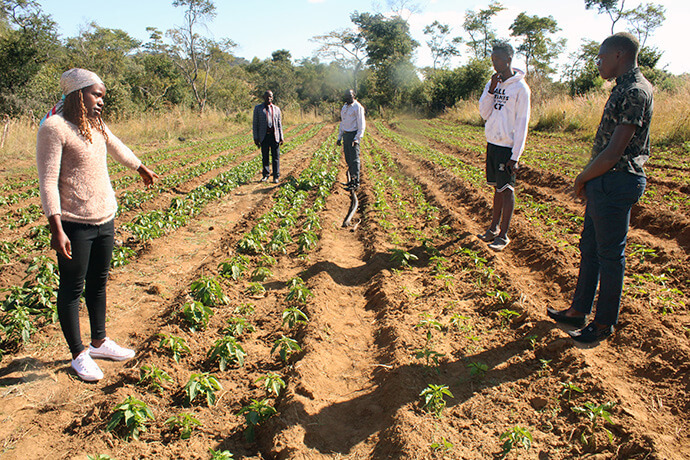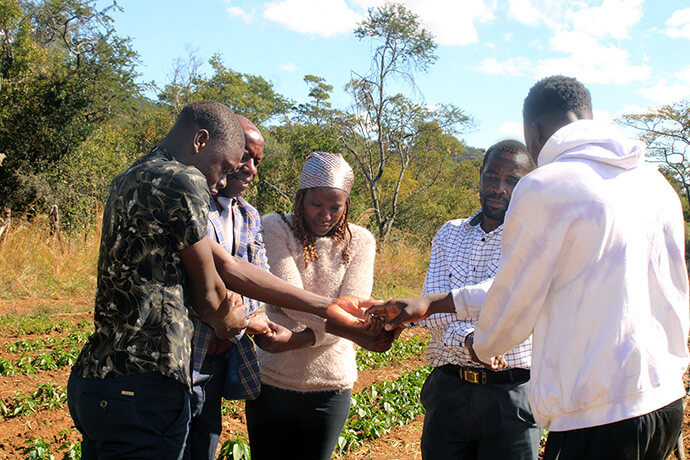Key points:
- After dropping out of school, Tafadzwa Chingosho gained skills through United Methodist programs that helped him pursue his dream of being a farmer.
- Hanwa Secondary School’s greenhouse project, funded by the church’s Yambasu Agricultural Initiative, helped to provide not only education but also life skills.
- Chingosho has inspired his community, especially other young people, who see him as an example of what they can achieve.
Academic failure is not the end of the road. Tafadzwa Chingosho is living proof.
The 18-year-old member of the United Methodist Youth Fellowship from the Murehwa South East Circuit dropped out of school after struggling academically. He came to realize, however, that God can rewrite any story.
He gained skills through Zimbabwe Volunteers in Mission — or ZimVim — and the United Methodist Board of Global Ministries’ Yambasu Agriculture Initiative greenhouse project at Hanwa Secondary School. With those experiences, he was able to embark on his own farming journey.
“I was not academically gifted,” Chingosho admitted. “But I allowed myself to explore and express my talents. When my cousin supported me with agricultural inputs and my parents with land, my life took a pleasant twist. I applied everything I had learned about pepper farming during agriculture lessons at Hanwa Secondary School.
“I now aim to become a leading supplier of high-quality peppers in the local market,” he said.
He expresses deep gratitude to ZimVim and Global Ministries for the greenhouse project at Hanwa, funded by the Yambasu Agriculture Initiative. “That project gave me real skills, and I am applying them now,” he said.
To other students facing academic difficulties, he offers advice: “Failure in school is not the end. Find your gift and pursue it. It keeps you focused, helps you avoid drugs and substance abuse, and pushes you to fight against poverty.”

Chingosho’s story has inspired the Hanwa community.
“The church is grateful to have someone like him,” said Gladman Kundhlande, pastor in charge of the youth fellowship. “We will continue to nurture, teach and equip all UMYF members to become self-reliant through income-generating activities.”
Stella Samanga, an agronomist at The United Methodist Church’s Hanwa Mission, described Chingosho as “a torchbearer in the community.”
“I support him by providing technical guidance, particularly in areas such as fertilizer and chemical application, as well as pest and disease control, to help him maximize his productivity,” Samanga said. “I also encourage him to conduct market research before starting each production cycle.
“At our greenhouse project,” she said, “we have since expanded greenhouse production, from green pepper production to introducing a wider range of vegetables that include tomatoes, baby marrow, broccoli and cornflower now at the market.
“This exposure would enable the community to cultivate a broader variety of crops, since we have positioned ourself as the pioneers in greenhouse production within the local agriculture,” she said.

Morgan Jeranyama, national consultant with the Yambasu Agriculture Initiative, emphasized Chingosho’s impact. “This is exactly what we hoped for from the Hanwa horticulture project — not just education but life skills. We want students to take what they learn in agriculture classes and apply it at home, fostering entrepreneurship and employment opportunities.”
Future plans call for establishing a horticulture nursery facility, which could provide seedlings for area farmers, he said. “This initiative is expected to strengthen local agricultural sustainability and economic growth.”
The Rev. Solomon Mawoyo, Zimbabwe West Conference education secretary, praised Chingosho’s support for a skills-based curriculum as a way to equip young people.
“I want to encourage parents to allow children to follow their passion. This can lead to fulfilling careers and a thriving society,” Mawoyo said.
Chingosho’s success is rooted in family support.
“We teach children who are differently gifted. Tafadzwa, my last-born of four, was not academically strong, but we supported his talent,” said father Julius Chingosho, a seventh-grade teacher at Hanwa Primary School. “After completing his O levels, he worked in the greenhouse at Hanwa and became motivated to start his own project. We have given him land and will continue to support him with whatever we can.”
Subscribe to our
e-newsletter
Tafadzwa Chingosho’s cousin, Zivanai Macharaga, has been one of his supporters. Macharaga spoke highly of his dedication.
“For many school leavers, farming is not the obvious path, but for Tafadzwa, agriculture is more than a career, it is a calling,” Macharaga said. “He approached me for assistance, and I helped him in the best way I could because I saw the passion and zeal he had for agriculture.”
Tafadzwa has become a role model in the church, said his mother, Muchavanzei Chingosho, Murehwa South East Circuit lay leader. “Many youths fall into drugs or crime when they fail academically. I am thankful to God that Tafadzwa chose something productive. He is an active youth member who knows and fears God and participates in development projects.”
Juliet Labson, 15, head girl at Hanwa Secondary, echoed that. “Many girls in our community fall pregnant when young. Some are into drugs and substance abuse or thieving. I admire Tafadzwa for choosing a better path. In Zimbabwe, the economy is tough, but at Hanwa, we have land and knowledge, which we can use to earn a living. Tafadzwa has shown us practical skills are powerful.
“In class, we often do not see the value of agriculture lessons, but seeing someone of our age succeed through farming is eye-opening. I encourage Tafadzwa to continue — he has motivated us all,” Labson said.
For Emmanuel Rukure, 19, Chingosho’s example has been transformative. Rukure, Tafadzwa’s friend and fellow UMYF member, is currently supplementing O-level subjects he did not pass. “We were in school together and worked in the greenhouse. What Tafadzwa has done inspires me. He has made me love farming.”
Tichaona Cornelius Dzvinamurungu, an agriculture teacher at Hanwa Secondary School, noted that students learn at their own pace. “Tafadzwa’s results did not mark an end, but a turning point. Education should create employers, not just employees — and Tafadzwa has proven that.
“Tafadzwa’s journey is a reminder that success is not defined by academic scores. With faith, support and determination, failure can become a foundation for greatness,” Dzvinamurungu said. “In Tafadzwa’s own words: ‘Find your gift and pursue it. Academic failure is not the end of the road.’”
Chingwe is a communicator for the Zimbabwe East Conference.
News media contact: Julie Dwyer at [email protected]. To read more United Methodist news, subscribe to the free UM News Digest.




